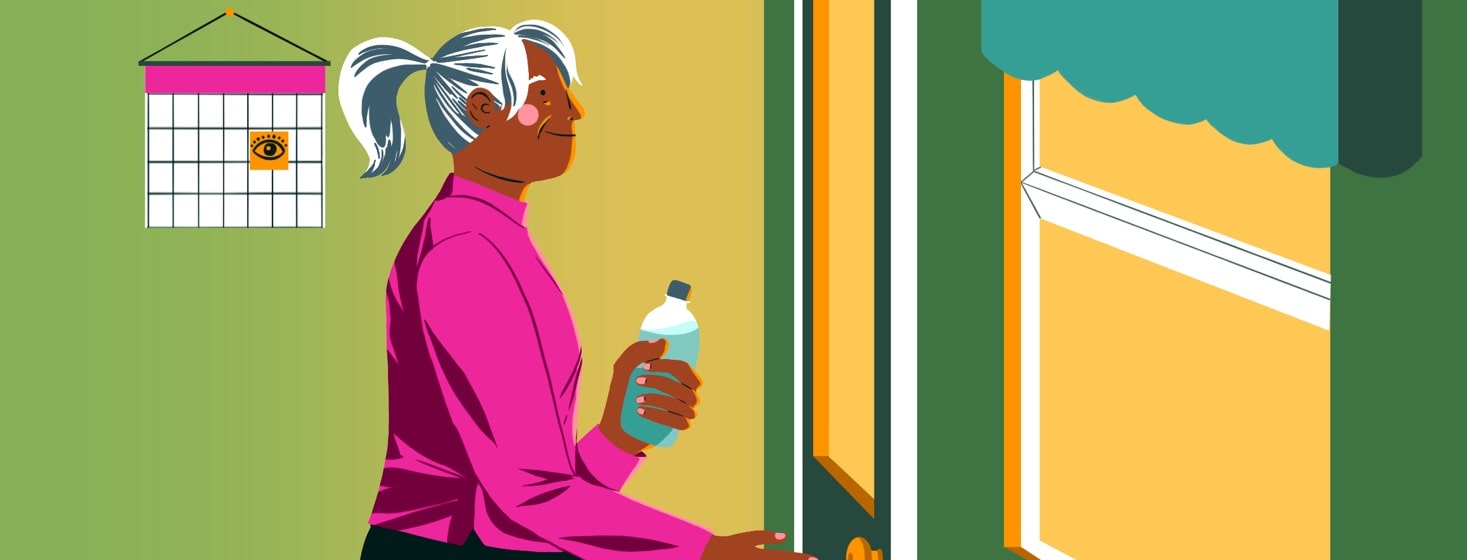3 Lessons on Seeing the Brighter Side
No matter your diagnosis or how long you have been challenged with macular degeneration (MD), we all know there is definitely a downside and to ignore that it exists is insensitive and doesn’t help. Existing and potential challenges need to be acknowledged. But can there be a brighter side?
The dark side often comes first and must be addressed
For many, the MD diagnosis is a dark time. However, staying in the dark indefinitely not only ruins quality of life, it keeps us from seeing the bright side and there CAN be a bright side, maybe not every day but often! A perfect example is my personal history with my mother, who was legally blind with dry AMD.
Grateful for the (negative) lessons learned
Many learned their greatest lessons from positive role models and are grateful to have had those people in their lives. However, when I was diagnosed with dry AMD (just like my mom), I did not have a positive reference to inspire me. My experience with my mother was quite negative, yet it taught me just as well as if she had been a positive role model. It was a more complicated approach but in the end, I was able to “find the bright side.”
My mother's deteriorating vision
Through much of mom’s vision challenges, she was retired and lived in a large fifth-wheel RV with my dad. They traveled extensively so we saw little of them. When they did visit, it was apparent that mom’s vision had deteriorated but she was still driving their car, following dad who was hauling the RV behind his truck. He just told her to watch his taillights and stay close behind. It still scares me to this day to think of her driving well beyond her vision capabilities. It was a miracle she never had an accident and hurt herself or someone else.
LESSON #1: Driving safety
I regularly check with my retina specialist to make sure it’s safe to continue driving and I have already limited driving at night, in the rain, or in unfamiliar areas because I know my reactions are slower due to my vision. Thanks, mom, for this reverse teaching!
My mother withdrew and isolated herself
When mom’s vision got worse, they sold the RV and moved into a continuous-care, senior community. They were surrounded with other people the same age, had numerous activities available, had a restaurant on-site, and could take advantage of many other amenities. They did none of those because mom couldn’t see. Instead, she isolated and only socialized when family and/or friends came to visit. I watched mom create a self-imposed shell and slowly become a recluse with a very low quality of life.
Her poor vision escalated into depression
We discussed her not socializing or participating but because she couldn’t recognize people and had to rely on others to assist her, she was strongly resistant to taking advantage of what was available. This broke my heart because she allowed her poor vision to escalate into depression, which might have been avoided. Even when neighbors stopped by to invite her to an activity, she declined because she couldn’t see. Experiencing this with my mom certainly left an impression on me that I recalled vividly when my vision started declining. I knew immediately that I wanted to do it differently than my mom.
LESSON #2: Enjoying a high-quality lifestyle
The diagnosis of MD does not mean you can no longer enjoy a high-quality lifestyle. It may look different than expected but it’s a choice we make on how to deal with it. I knew for sure that I did NOT want to “be like my mom.” I was determined to do it differently.
Unhealthy choices
I understand it’s easier today with access to valuable information - and knowledge certainly IS power - but I also know mom did very little to stop the progression. She was a chain smoker, overweight, did not take eye vitamins, did not exercise, or make smart food choices. I wonder - could there have been a better outcome had mom cooperated on those things she could control? I intend to find out!
LESSON #3: Slowing progression through a healthy lifestyle
We may slow the progression of MD with a healthy lifestyle, including exercise, a healthy diet, not smoking, and taking eye vitamins (such as PreserVision, AREDS 2). Mom paid little attention to any of those recommendations. However, we can be optimistic that by following these suggestions, we may have a far different outcome or at least extend the time we have better vision. As a result of following these recommendations, I know my experience may be far different than my mother’s!
The bottom line? MD can be a very negative experience or we can choose to see the “brighter side” by turning the negatives into positives for the best possible life! 💜 Linda Hoopes
Editor's Note: As of August 2023, 2 drugs known as complement inhibitors — Syfovre® and Izervay™ — have been approved by the US Food and Drug Administration (FDA) to treat the advanced stage of dry age-related macular degeneration, or geographic atrophy (GA).

Join the conversation